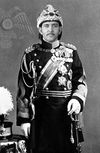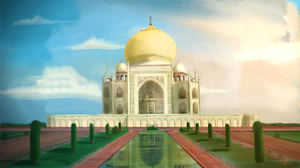Tobu Emperor
| Tobu Emperor | |
 | |
| Full name | Abu Çakar |
|---|---|
| AKA | Tobu Emperor |
| Physical information | |
| Species | Human |
| Gender | Male |
| Hair color and style | Black |
| Eye color | Brown |
| Skin color | White |
| Other | moustache |
| Biographical information | |
| Father | Ümit Çakar |
| Mother | Hamida Banu |
| Date of birth | 1669 |
| Place of birth | Šer-Ku-Riž, Krasnocoria |
| Date of death | 1704 |
| Place of death | Apollonium |
| Residence(s) | Agra |
| Nationality | Çakari |
| Allegiance(s) | Great Apollonian Empire |
| Occupation | Emperor of Great Apollonia, Sultan of Çakaristan |
The Tobu Emperor (東部, "eastern ministry/department/division"; Sangunese pronunciation: Tōbu; Jingdaoese pronunciation: Dōngbù), or before his ascension known as Akbar (Arboric: اکبر; Adarani: अकबर), full name: Abu Çakar, was the only Emperor of the Great Apollonian Empire. Before his ascension to the Two Headed Eagle Throne, he was Sultan of Çakaristan, since his coronation on 4.XIII.1688 AN and was given the title: Akbar (great).
Early years
Abu was born on 15.VIII.1669 AN in Šer-Ku-Riž. He is the third son of Ümit Çakar and Hamida Banu. Because his father was one of the leaders of the rebellion against the Kingdom of Krasnocoria in the Hasani War (1680 - 1685 AN) he had to go into hiding.
He emerged as a skillful diplomat and strategist during the Sylvanian National Awakening (1687 - 1689 AN). In particular to steal the aircraft carrier of the Emir of Arbor. On the day the war of independence ended Abu was elected sultan.
Akbar's reign
Sultan of Çakaristan
On the day he was elected Sultan, an assassination attempt was made on his life. The attempt failed, but his government was begun under the leadership of the Grand Vizier.
His early reign knew major successes in conquering the Krasnocorian homelands and establishing a strong presence of the Çakari in the region around the Antican Sea. Attempts to integrate Tiegang into his empire failed due to an international coalition of military powers, and his government soon shifted to establishing amicable relations with the International Mandate of Settlements.
Simultaneously, his nation established fruitful relations (often focused on trade) with foreign powers, like Senya en Jingdao. It joined the USSO in 1689 AN and became a fierce supporter of the Apollonian Express.
Reign as emperor

The 1690's proved a challenge to the stability on the continent. The largest political and economical power house on the continent, Jingdao, descended into chaos after the ascension of the Chidao Emperor to Heaven. With the Post-Chidao Troubles erupting and the Xinshi Emperor remaining powerless (or at least unwilling or uninterested to throw Her full influence in the struggle), many in the Çakari government looked at their Sultan to intervene to stabilise the situation.
It was only after terrorist attacks brought havoc to Fatehpur and Manbai on 9.XI.1697, that preparations for the subjugation of the Seishi rebels were made. A month later, the Çakari Armed Forces started Operation: Nae jeevan kee raksha with the consent of the Xinshi Emperor.
The successes of the operation and the ongoing power struggle among the Jingdaoese warlords eventually led to the Conference of Apollo in 1698 AN, near Xiacheng. After much discussion, Akbar was appointed Emperor of a new (con)federation, the Great Apollonian Empire. He received the title of Tobu Emperor, also known as 'Eastern Emperor'.
The Empire, united on paper, was challenged both by domestic and foreign threats. With rebels roaming the countryside, communists ruling supreme in Xianbei Province and Raspurists supporting Dalmacijan troops, and local assemblies protecting their autonomy, the new empire could hardly be called supreme.
Marriage and family


On the day of his coronation, Akbar officially married Jodha Avchat. The marriage is an arranged marriage, which his brother Hasan Çakar and her father Rajesh Avchat agreed to. Despite the fact that at that time it was not yet known who the new ruler would be, Jodha would marry the future ruler in exchange for military support by Rajesh. A dowry was weighed because Akbar was sitting on one of the scales and the dowry was placed on the other. In the case of balance, there was sufficient input.
A wedding ceremony was held when Akbar had recovered from the attack. Rumours from the court revealed that initially Akbar and Jodha did not have a full-fledged marriage, but later it turned out that the arranged marriage resulted in love after all. The first time the couple were expecting, it turned out that things were not going well. After a revelation from the Craitgod, the marriage turned out to be strong.
The couple was blessed with children:
- Aishwarya was born on 12.XI.1691 AN
- Hrithik was born on 22.XI.1693 AN
- Salim was born on 24.XII.1696 AN
- Mandira was born on 3.VII.1698 AN
- Qasima was born on 22.I.1702 AN
Assassination
The Emperor and Empress were driven to the Congress in a convertible. The disturbances in the country had not worried the Emperor. Later it would appear that the Emperor had been insufficiently informed; possibly the Grandshire played a role in this. For the ceremonial opening of the Congress, the Emperor wanted to be visible to his loyal subjects. The route from the imperial palace to the Congress was, of course, publicly known. Security with snipers, drones and fences was in place. Suddenly, shots rang out. The first shot missed, while a second shot did hit the emperor. The emperor fell to his left, where the empress caught him. The guards from the follow car came running up and jumped on the car. This was too late, however, as a third shot hit the emperor. This would prove to be the fatal shot.
The convertible began to move faster, but was held up by the slower-moving motorbikes. This was short-lived, so the convoy drove quickly to the hospital. At the hospital there was great chaos; the empress stayed with her husband. The operating theatre, to which the emperor had been taken, was full of policemen, security guards, doctors and so on. The empress went crazy from the chaos and shouted at everyone to be quiet: "The emperor is dead, have some respect". The empress burst into tears and cried over the dead body of her husband.
The assassination resulted in a succession crisis, due to the absence of a constitution or any other arrangement for succession.
Burial

Akbar's body was transferred to Agra. There, the body was interred in the Crait temple in the Red Fortress. Only Akbar had already made a design for a mausoleum. Jaaguzan gave Jodha permission and the paid the construction cost. In 1712, the Akbar Mahal was completed, with a respectful ceremony Akbar was interred. In this, his son, Hrithik, performed the missing man formation as a fighter pilot.
| Preceded by: Position created |
Sultan of Çakaristan / Emperor of Great Apollonia 1688–1704 |
Succeeded by Jaaguzan |